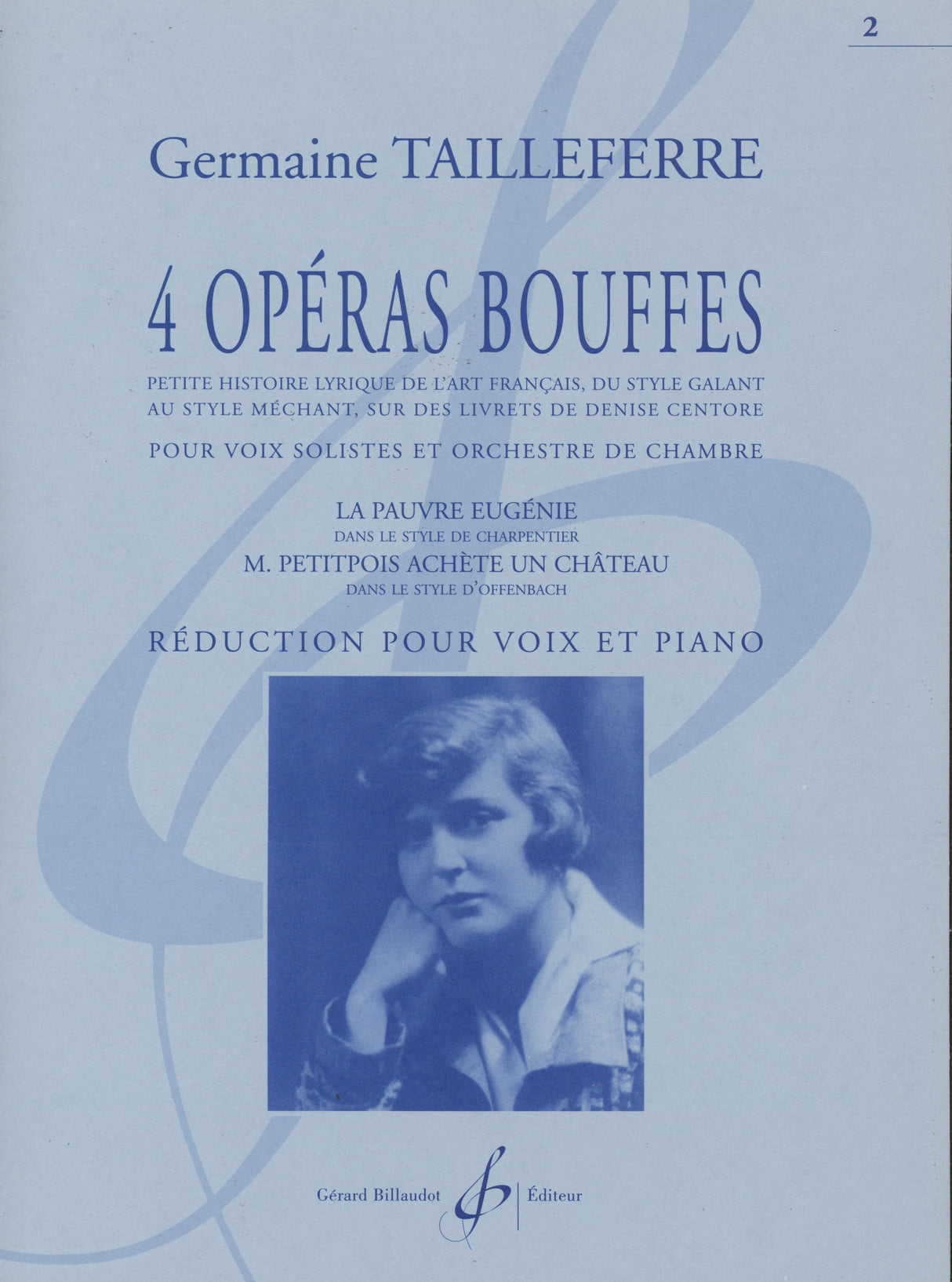Tailleferre: Opéras Bouffes - Volume 2 (La Pauvre Eugénie / M. Petitpois Achète Un Château)
In stock and typically ships within 1 business day.
- Composer: Germaine Tailleferre (1892-1983)
- Instrumentation: Opera
- Work Language: French
- ISMN:
- Size: 9.1 x 11.9 inches
Description
Libretto by Denise Centore
Pursuing their pastiche of French opera, Germaine Tailleferre and Denise Centore now turn to the great realistic vein of Gustave Charpentier and Alfred Bruneau, whose pioneering approach invited everyday language and characters to the operatic stage. Pauvre Eugénie takes place in Paris in 1905, at Madame Phémie's lingerie workshOp. She has a husband, Monsieur Ernesse, and employs three seamstresses: the impish Titine, the sentimental Paula, and Eugénie, the heroine of this story, or rather (to keep with the spirit of that time), of these "slices of life" - the musical equivalent of Zola's Rougon-Macquart. Gégène appears only at the end. At the beginning of the opera, the three girls are busy sewing fine lawn petticoats frilled with lace while Monsieur Ernest makes no secret of his bad mood. Madame Phémie scolds the girls for being lazy and suddenly discovers that Eugénie is not working but eating garlic sausage! Fired on the sport for misdemeanor, the poor, desperate girl wants to drown herself in the Seine. Horrified at the thought, Titine and Paula remind her of the child she's had with that Monsieur J. Duplan who once promised to marry her. Surely, she does not want the poor child to be an orphan? At that very moment, someone knocks at the door: it is Gégène, with a feather boa for Madame Phémie. Titine and Paula are indignant: how can she be thinking of feather boas when she has just fired a poor single mother! Gégène is just as indignant and wants to meet Eugénie. It is love at first sight! All's well that ends well: Eugénie goes off with Gégène, leaving her heartless employer.
The last (existing) opera of the cycle is the Offenbach-flavored Monsieur Petitpois achète un château. The protagonists are clad in Second Empire fashion, and the scene is a medieval castle near Romorantin, the family estate of Monsieur le Duc de la Bombardière. The duke has everything: a son, Adélestan (a handsome young man who serves as a hussar lieutenant), a devoted and familiar servant, Cunégonde (Adélestan's old nurse), and an able notary, Maître Pointillard. The one thing he does not have is… money. That is, he still has some, but how long will it last? He has resolved to sell his castle and is currently waiting for a potential buyer, Monsieur Petitpois. He's discussing the matter with his notary, and right after the overture, will even ask his maid, Madame Cunégonde, for advice.
Works:
- La pauvre Eugénie (1955)
- Monsieur Petitpois achete un château (1955)
Publishers use a lot of words to describe what they sell, and we know it can be confusing. We've tried to be as clear as possible to make sure you get exactly what you are looking for. Below are descriptions of the terms that we use to describe the various formats that music often comes in.
Choral Score
A score for vocalists that only contains the vocal lines. The instrumental parts are not there for reference. Generally, cheaper than a vocal score and requires multiple copies for purchase.
Facsimile
Reproductions of the original hand-written scores from the composer.
Full Score
For ensemble music, this indicates that the edition contains all parts on a single system (there are not separate parts for each player). In larger ensembles, this is for the conductor.
Hardcover
Hardbound. Generally either linen-covered or half-leather.
Orchestral Parts
Similar to a wind set, this is a collection of parts. In the case of strings, the numbers listed are the number of copies included, though generally these are available individually (often with minimum quantities required).
Paperback
When publishers offer multiple bindings (e.g. hardcover) or study scores, this is the "standard" version. If you're planning to play the music, this is probably what you want.
Performance / Playing Score
A score of the music containing all parts on one system, intended for players to share. There are not separate parts for each player.
Set of Parts
For ensemble music, this indicates that there are separate individual parts for each player.
Solo Part with Piano Reduction
For solo pieces with orchestra, this is a version that contains a piano reduction of the orchestra parts. For piano pieces, two copies are typically needed for performance.
Study Score
A small (think choral size) copy of the complete score meant for studying, and not playing. They make great add-ons when learning concertos and small chamber works.
Vocal Score
A score prepared for vocalists that includes the piano/organ part or a reduction of the instrumental parts.
Wind Set
For orchestral music, this is a collection of wind and percussion parts. The specific quantities of each instrument are notated.
With Audio
In addition to the printed music, the edition contains recordings of the pieces. This may be an included CD, or access to files on the internet.
With / Without Fingering (Markings)
Some publishers prepare two copies - a pure Urtext edition that includes no fingering (or bowing) suggestions and a lightly edited version that includes a minimal number of editorial markings.


